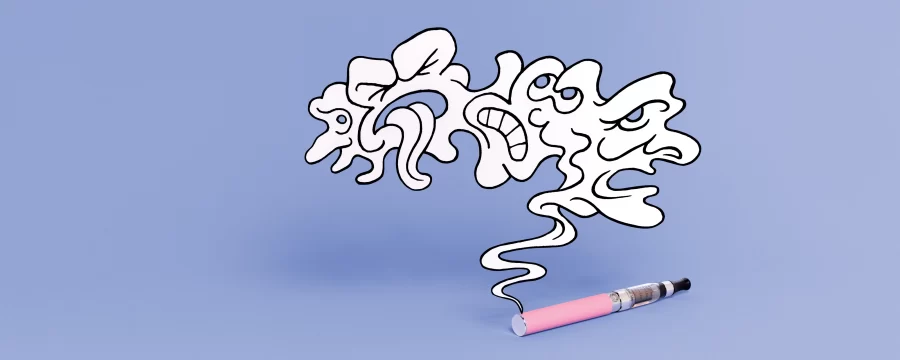A Proposal to End Teenage Addiction
An examination of the current state of nicotine addiction
Introduction
Nicotine is defined by the FDA as an addictive substance. Taking the form of many different methods of delivery, it has become extraordinarily widespread and is prevalent all over the world. Nicotine has grown to be a huge industry, bringing in billions of dollars every year. However, this is at the cost of the user. Despite many campaigns trying to limit usage, nicotine remains as commonplace as it is today as a result of its addictive nature, but also through the work of the organizations in the tobacco industry to promote the substance. In turn, nicotine has also become very popular among the youth as well. According to an article by the US National Library of Medicine, “More than 80% of smokers start by age 18” (Berrick par. 1). Nicotine is of course very detrimental and has been linked to cancer, so there is a clear problem that needs to be addressed in limiting youth nicotine addiction. In particular, proposals of banning nicotine entirely have been made as well as similar proposals to limit electronic vaping or cigarettes. These proposals, while supported by many, come with the anger of critics who declare such proposals unethical, even in the effort to combat teenage nicotine addiction. Overall, there is evidence that it is ethical that nicotine should be banned entirely to combat teenage nicotine addictions as well as evidence to the contrary, that it is unethical to create a widespread nicotine ban.
Ethical Total Ban on Nicotine
As a result of its addictive nature and harmful effects, particularly in respect to the teenage population, proposals to limit nicotine have been debated over many times within the last decade. One significant proposal that has gained attraction is that of a complete ban on nicotine, mirroring a similar ban that took place in Australia on Electronic Nicotine Delivery Systems (ENDS). With the growing popularity of this proposal and variations to it, many debates over its ethics have arisen. However, it can be contended that a total ban is ethical, despite critics’ claims that it limits individual freedoms. According to Professor A J Berrick of Yale-NUS College, “If there are insufficiently many same-age peers willing to share and buy cigarettes from each other, then the purchase of a packet is more difficult for the novice smoker to justify” (par. 15). A complete ban will lead to almost complete elimination of teenage nicotine addiction by eliminating social pressure that might influence a teenager to begin nicotine usage. In addition to creating a vacuum that would leave it extraordinarily difficult for a teenager to obtain nicotine, such a proposal would reduce the number of peers smoking, a prime reason as to why most teenage smokers begin in the first place. The benefits of such a proposal are further explained by Dr. Robert N Proctor of Stanford University, in that beyond “Reducing human suffering, abolishing the sale of cigarettes would result in savings in the realm of healthcare costs, increased labour productivity, lessened harms from fires, reduced consumption of scarce physical resources, and a smaller global carbon footprint” (par. 1). As explained by Dr. Proctor, a ban on cigarettes- and nicotine, in general, would constitute benefits that far outweigh its drawbacks. Its benefits on the community overrule its negative effects in what may be perceived as limiting individual freedoms and as a result, a ban can be considered ethical. Professor Darren Shickle, of the Academic Unit of Public Health contends that a paternalistic approach to the issue is justifiable in that it would prevent the smoker from the addictiveness of nicotine, which in such a way makes nicotine use almost out of their control (par. 19). This quote relates to the defining principle in favor of a complete nicotine ban. Under a paternalistic view, it can be argued that public health policies such as a total ban could be justified in that it is protecting smokers from themselves, as they are unable to quit as a result of the addictive nature of nicotine. Under such circumstances and “seen through this lens, endgames are not unjustified paternalism but the long-overdue closure of a cavernous gap in health and safety standards” (Thomas, Gostin par. 5). A total ban, if enacted, will help prevent teenage addiction as well as it would eliminate the entire source from which teenagers can gain nicotine access. The significance of the perspective that a complete ban on nicotine is ethical is that its passing would drastically reduce the amount of teenagers smoking and curb teenage addiction.
Proposed Bans Would be Unethical
In efforts to combat teenage nicotine addiction, a total ban would infringe on smokers’ rights and would be ineffective, limiting its potential. As a result, such a ban should not be implemented nor encouraged as its drawbacks outweigh its potential benefits. As discussed by Wayne Hall, Coral Gartner, and Cynthia Forlini in association with the Centre for Youth Substance Abuse Research, “Respect for autonomy: prohibiting ENDS infringes on smokers’ autonomy to use a less harmful nicotine product while inconsistently allowing individuals to begin and continue smoking cigarettes” (par. 4). As considered in the writings of the Centre for Youth Substance Abuse Research, a nicotine ban is unethical as it would infringe on the rights of smokers. Additionally, another version of such a ban would limit smokers’ efforts to use a less harmful nicotine product than cigarettes. Mike Daube, Professor of Health Policy, Curtin University writes a total ban could be perceived not as an effort to combat teenage addiction but rather penalizing adult smokers (par. 12). A total ban would create legitimate arguments in opposition, explaining why it can be considered unethical as well as preventing effective nicotine alternatives to try to end smoking. This position is solidified by Dr. Satel, an expert in addiction psychology as she writes, “Without question, we must reduce teen vaping but other non-prohibitionist solutions can help achieve that imperative. We must not impede vital access to vaping products for the 11-14 million adult vapers” (par. 2). In short, while discussing a popular ban on ENDS, Satel argues that in an effort to limit teenage nicotine use, it is unethical to ban adults from accessing nicotine even trying to combat teenage addiction. In this example, she references how a ban on vaping would prevent 11-14 million vapers from accessing ENDS. The perspective that a total nicotine ban is unethical is significant because it limits what could have been a potential solution in combating teenage nicotine addiction.
Conclusion
In examining the varying proposals through an ethical perspective, different schools of thought and moral considerations are called into question that argues the ethics of such a nicotine ban. Its proponents argue that a paternalistic approach is justified, while its critics argue that it would seemingly persecute adult smokers. Critics of such a ban further reference the legal difficulties in passing such a ban as current legislation prevents a total ban (“FDA gains the power” par. 3). Therefore, a solution to the conflict to ban nicotine and specifically to what extent nicotine should be banned lies somewhere in the middle. In efforts to combat teenage nicotine addiction, it can be contended that a complete ban on ENDS should be passed. This is the primary nicotine delivery device used by the teenage population and restricting it entirely would have significant effects in ending addiction. In turn, this allows adult smokers to continue to have access to nicotine, as is their legal right. Yet, with this proposal, there will be obvious limitations such as actually creating and pushing through such a law. The tobacco industry is an extraordinarily profitable industry and they will lobby hard to prevent any such legislation from passing, as it is a primary source of their revenue. Yet, from an ethical perspective, it is perhaps the most ethical, middle-ground solution that works to combat teenage addiction but also protects smoker autonomy.
Works Cited
Berrick, A J. “The Tobacco-Free Generation Proposal.” Tobacco Control, BMJ Publishing Group, May 2013, www.ncbi.nlm.nih.gov/pmc/articles/PMC3632970/.
“FDA Gains the Power to Regulate Tobacco Products.” Nature, vol. 459, no. 7249, 18 June 2009, p. 901. Gale Academic OneFile, link.gale.com/apps/doc/A202562475/AONE?u=char21995&sid=bookmark-AONE&xid=dcf9ea31. Accessed 8 Nov. 2021.
Hall, Gartner, and Forlini. “Ethical Issues Raised by a Ban on the Sale of Electronic Nicotine Devices.” Addiction (Abingdon, England), U.S. National Library of Medicine, pubmed.ncbi.nlm.nih.gov/25845485/.
Mike Daube. “Bring on the End of Tobacco Use – but Not a Total Ban Tomorrow.” The Conversation, 6 Apr. 2021, theconversation.com/bring-on-the-end-of-tobacco-use-but-not-a-total-ban-tomorrow-8881.
Proctor, Robert N. “Why Ban the Sale of Cigarettes? The Case for Abolition.” Tobacco Control, BMJ Publishing Group, May 2013, www.ncbi.nlm.nih.gov/pmc/articles/PMC3632991/.
Satel, Sally L. “Cons of Vaping: Should Congress Pass Stronger Vaping Regulations and Ban the Sale of Certain e-Cigarette Products?” Congressional Digest, vol. 100, no. 2, Feb. 2021, pp. 19–23. EBSCOhost, search.ebscohost.com/login.aspx?direct=true&db=aph&AN=148289910&site=ehost-live.
Shickle, D. “The Ethics of Public Health Practice: Balancing Private and Public Interest within Tobacco Policy.” British Medical Bulletin, vol. 91, no. 1, 2009, pp. 7–22., doi:10.1093/bmb/ldp022.
Thomas, Bryan P, and Lawrence O Gostin. “Tobacco Endgame Strategies: Challenges in Ethics and Law.” Tobacco Control, vol. 22, no. suppl 1, 2013, pp. i55–i57., doi:10.1136/tobaccocontrol-2012-050839.












Chase Roberts • Feb 24, 2023 at 11:26 am
This is fire McRae good work.